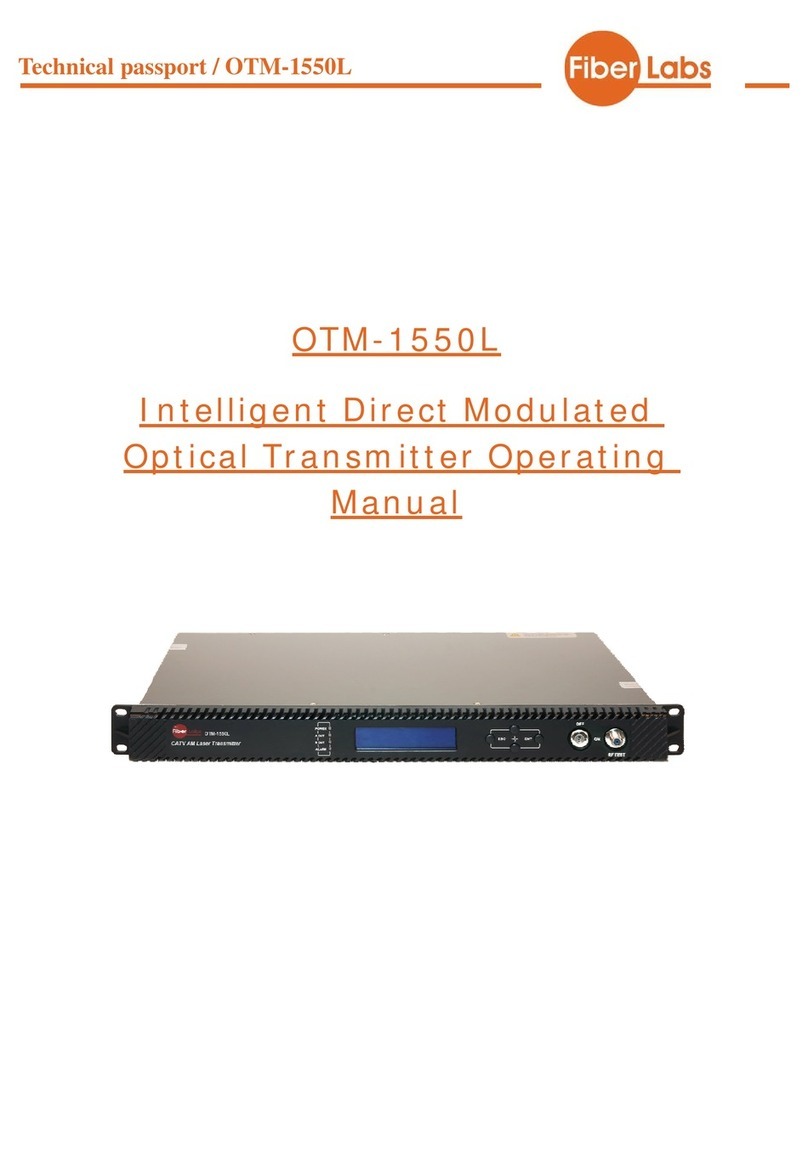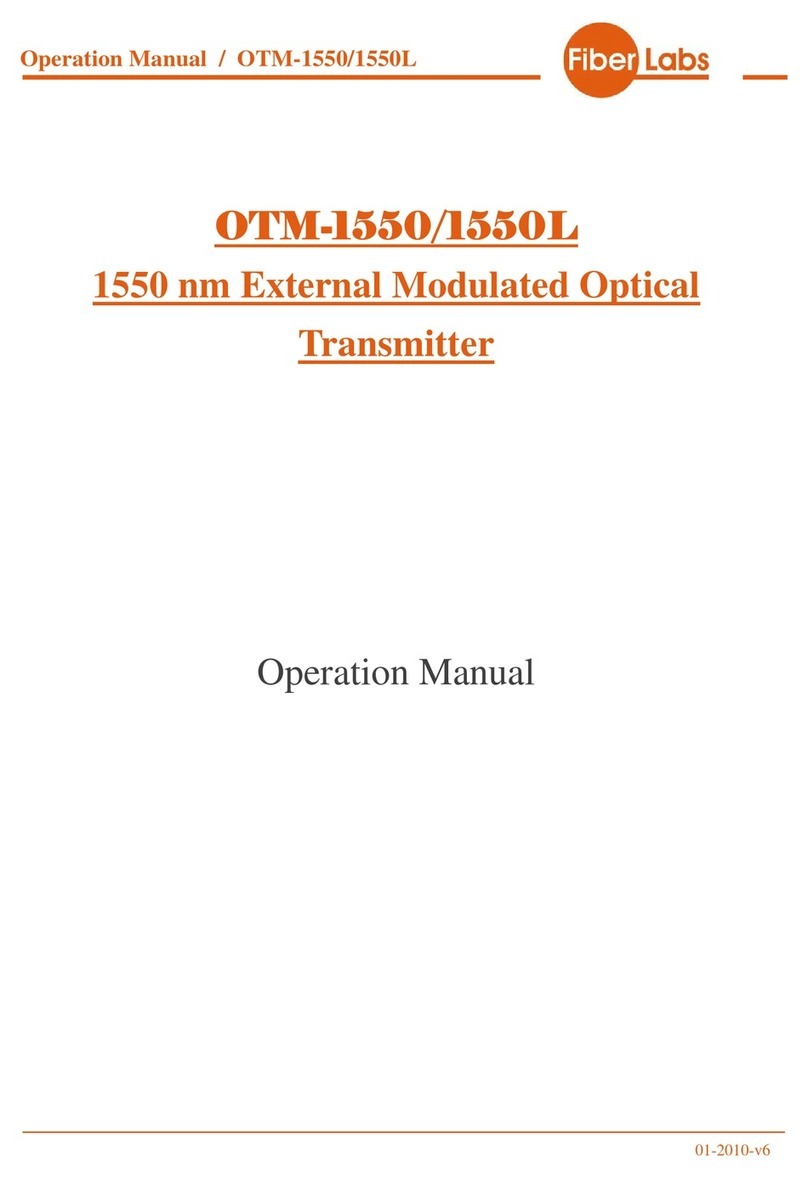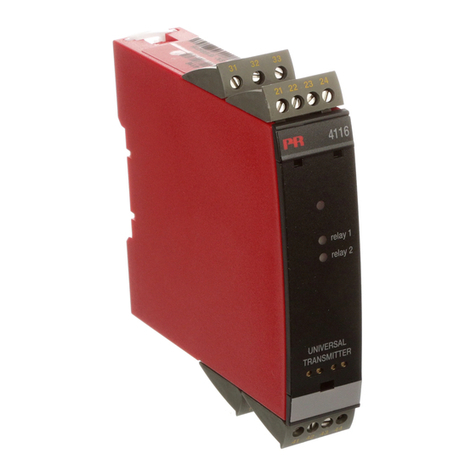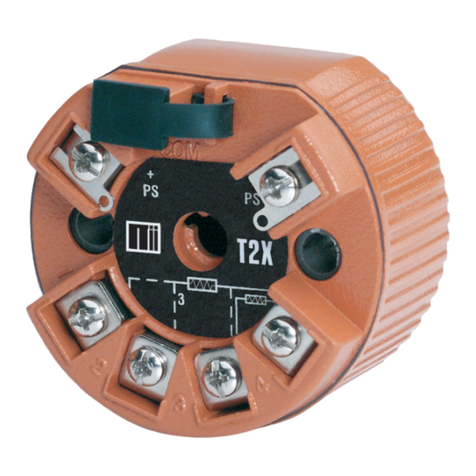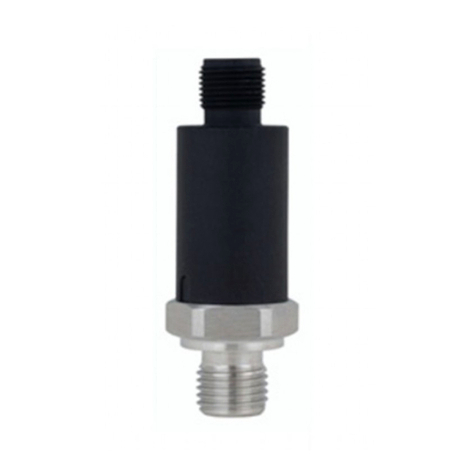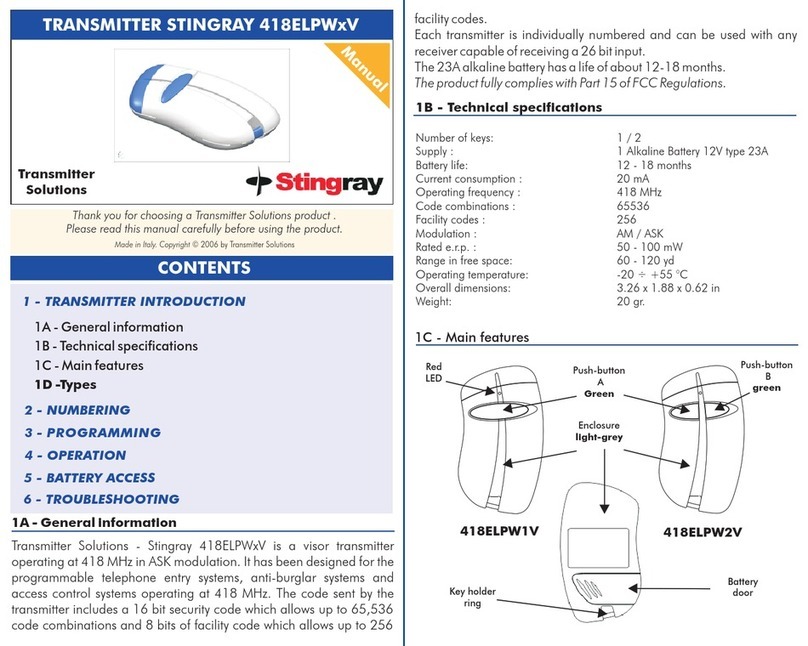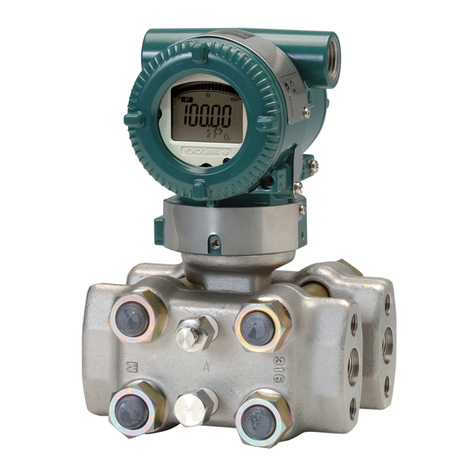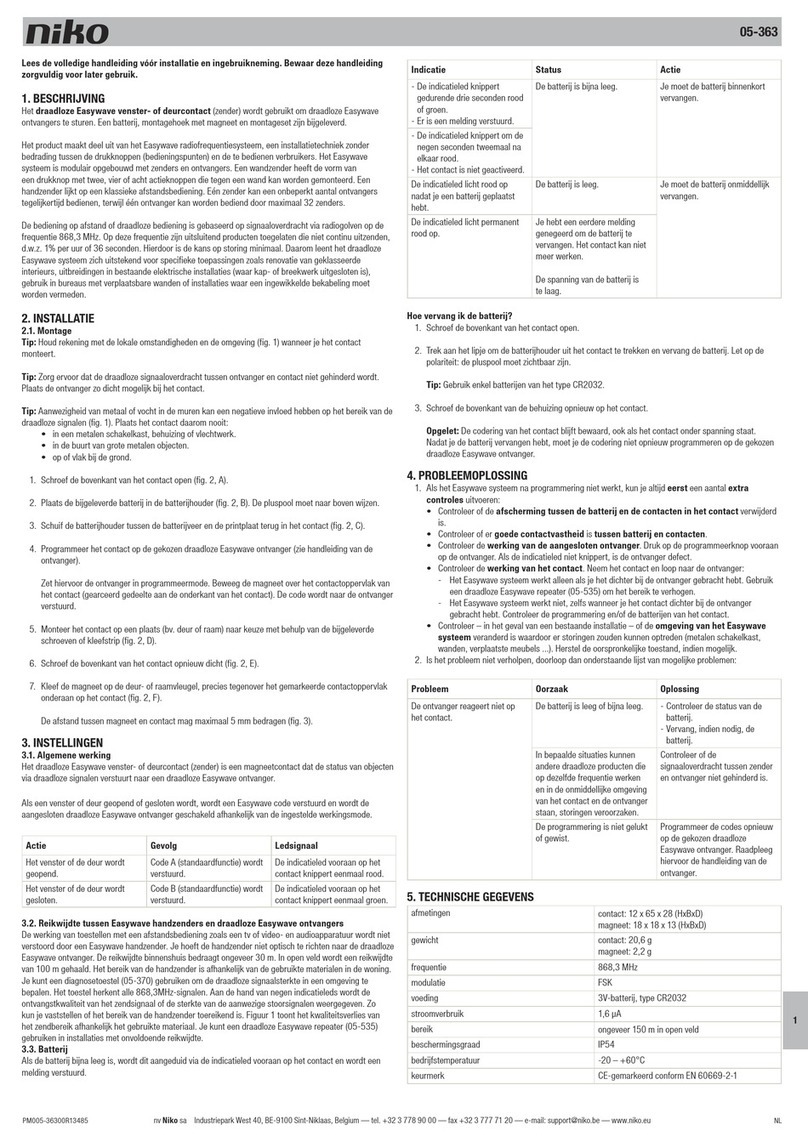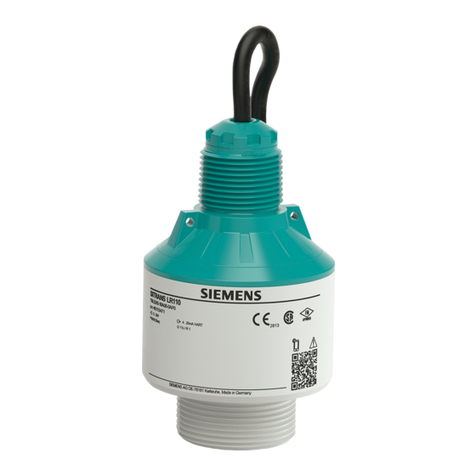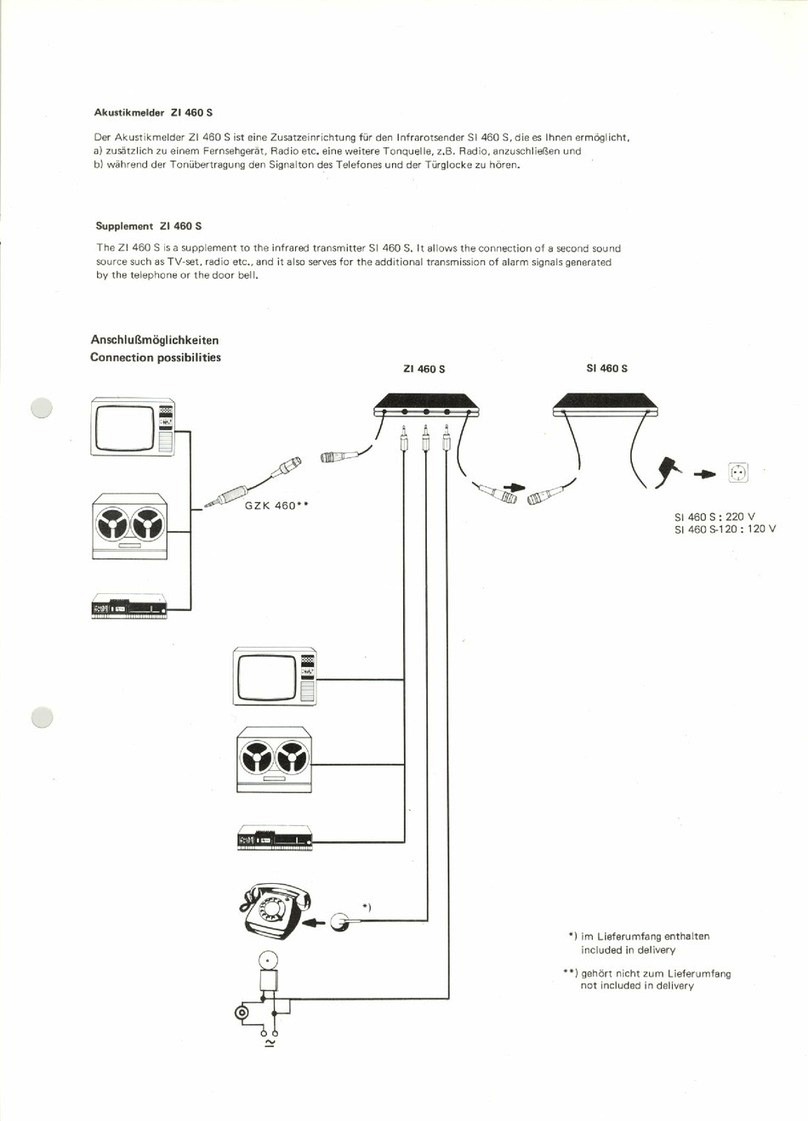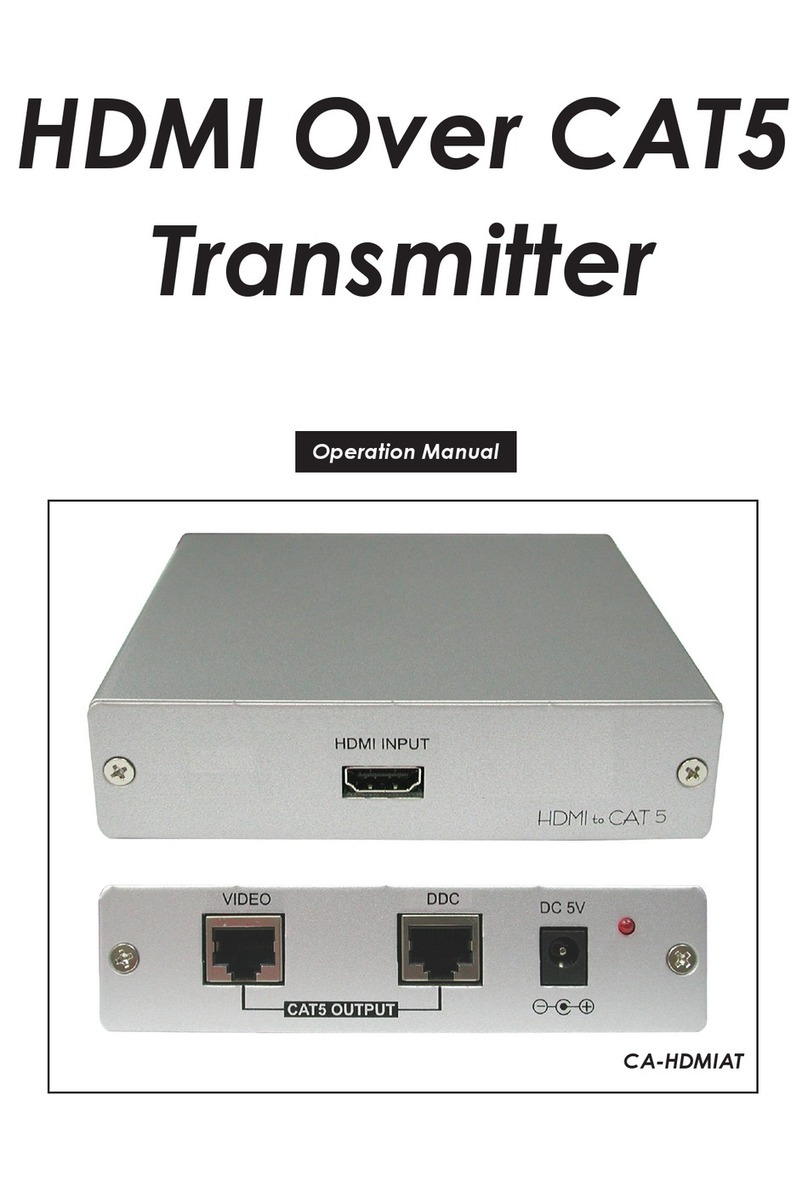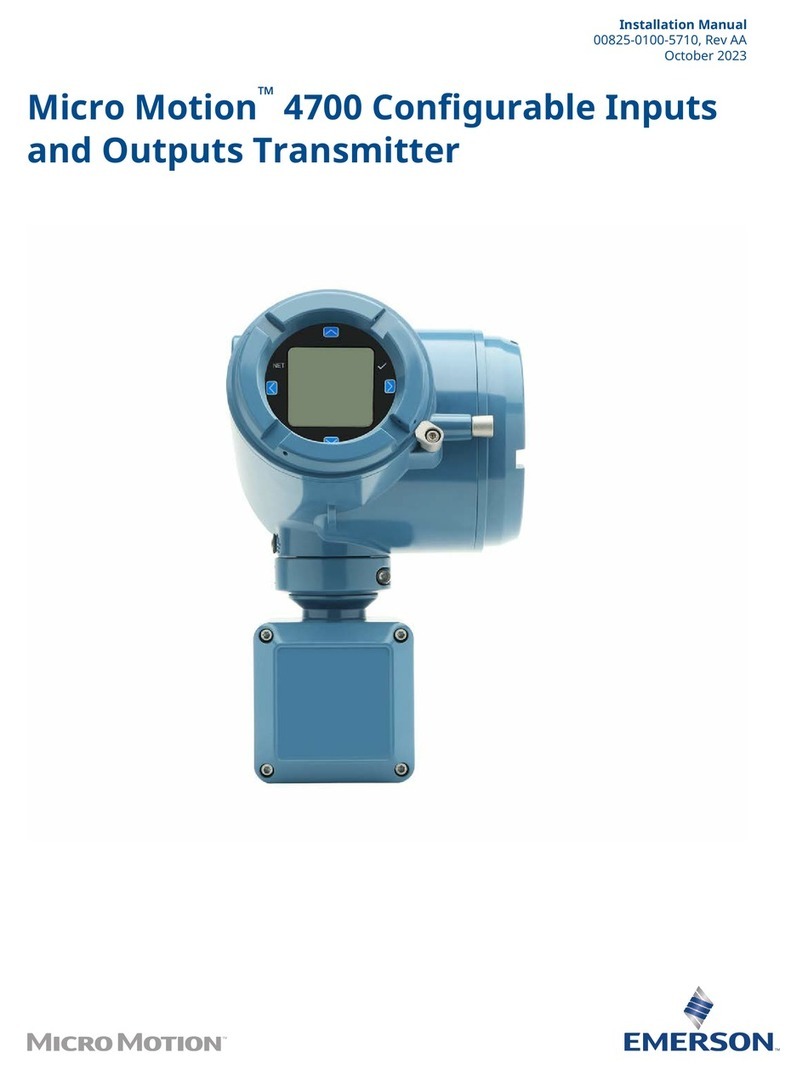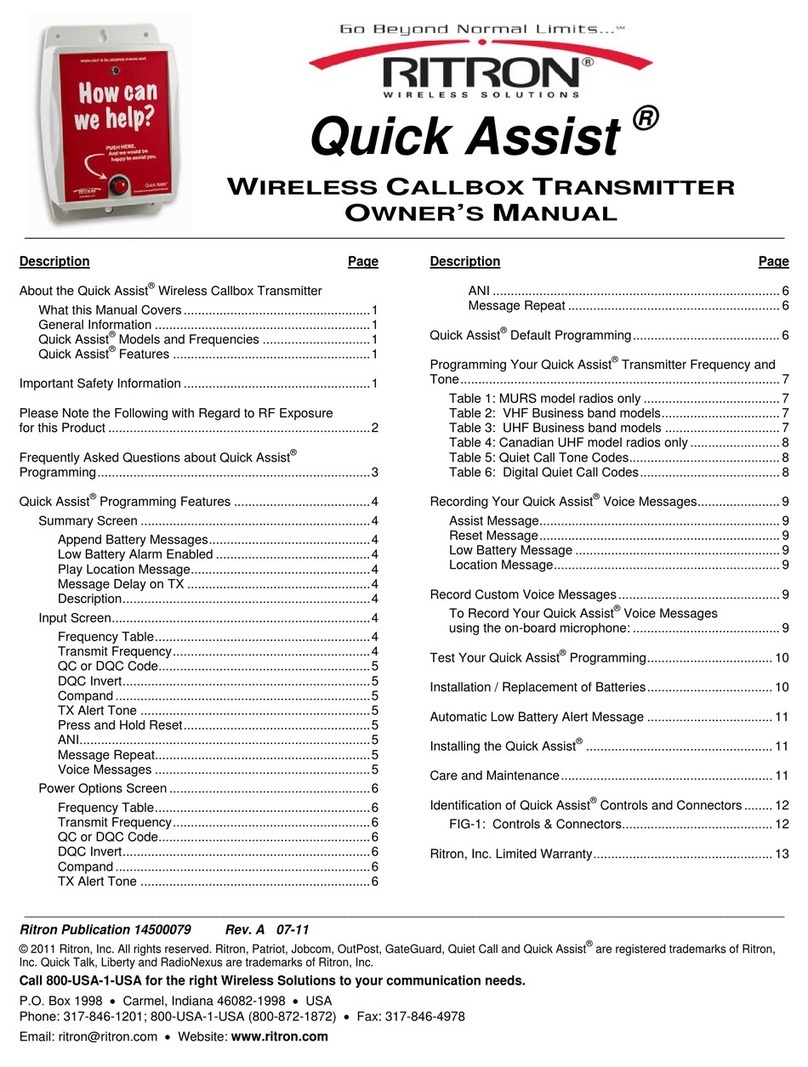FiberLabs OTM-1550 User manual

Technical passport / OTM-1550
12-2016-v4
OTM-1550
1550nm Externally Modulated Optical
Transmitter Operating Manual

Technical passport / OTM-1550
12-2016-v4
2
Table of Contents
TABLE OF CONTENTS ..................................................................................2
SAFETY INSTRUCTION .................................................................................3
1. OVERVIEW..................................................................................................4
1.1 About This Manual...............................................................................................4
1.2 Product Description..............................................................................................4
1.3 Product Applications ............................................................................................5
2. TECHNIQUE PARAMETERS......................................................................6
2.1 Optical Parameters ...............................................................................................6
2.2 Model Test Indicators...........................................................................................6
2.3 Test Condition ......................................................................................................7
2.4 Technical Data Sheet............................................................................................7
3. PANEL INTERFACE AND MENU SYSTEM DESCRIPTION.......................7
3.1 Front Panel ...........................................................................................................7
3.1.1 Indicator Description .....................................................................................8
3.2 Rear Panel ............................................................................................................8
3.3 Power Module ......................................................................................................8
3.3.1 220V Power Module......................................................................................8
3.3.2 48V Power Module........................................................................................9
3.4 Menu Operation....................................................................................................9
3.4.1 Main Menu.....................................................................................................9
3.4.2 Display Menu...............................................................................................10
3.4.3 Set Menu...................................................................................................... 11
3.4.4 Alarm Menu.................................................................................................12
3.4.5 AGC Mode...................................................................................................12
3.4.6 MGC Mode..................................................................................................12
3.4.7 Frequency Adjust ITU in DWDM ...............................................................13
3.4.8 SBS Suppression Adjustment ......................................................................13
4. INSTALLING THE OTM-1550 OPTICAL TRANSMITTER........................14
4.1 Receiving and Inspecting ................................................................................... 14
4.2 Precautions .........................................................................................................14
4.3 Mounting OTM-1550.........................................................................................15
4.3.1 Mounting the OTM-1550 in the Rack .........................................................15
4.3.2 Connecting the RF Cables ...........................................................................15
4.3.3 Connecting the Optical Fiber Cables...........................................................15
4.3.4 Connecting the Ethernet Cable ....................................................................16
4.3.5 Connecting Power........................................................................................16
5. COMMUNICATION SETUP.......................................................................17
5.1 RS232 Communication Interface Description ...................................................17
5.2 Set up the Hyper Terminal..................................................................................17
5.3 Operating Parameters Configuration..................................................................19
5.4 Remote Monitoring: SNMP ...............................................................................22

Technical passport / OTM-1550
12-2016-v4
5.5 WEB Network Management ..............................................................................22
6. MAINTENANCE AND TROUBLESHOOTING ..........................................25
6.1 Cleaning Fiber Optic Connectors.......................................................................25
6.1.1 Cleaning Patch Cord or Pigtail Fiber Optical Connectors...........................25
6.2 Troubleshooting..................................................................................................26
6.3 After-sales Service Description..........................................................................27
6.4 Disclaimer ..........................................................................................................27
Safety Instruction
3

Technical passport / OTM-1550
12-2016-v4
4
1. Overview
1.1 About This Manual
This instruction manual is a complete guide to install and operate the (1RU) OTM-1550 series
1550nm externally modulated optical transmitter. Please read the entire manual before beginning
installation.
This manual applies to OTM-1550 series externally modulated optical transmitter.
• Chapter 1 gives general information about the OTM-1550 series 1550nm externally modulated optical
transmitter.
• Chapter 2 describes the complete technical specifications of OTM-1550.
• Chapter 3 describes the front/rear panel interfaces and menu system.
• Chapter 4 tells you how to install OTM-1550 series externally modulated optical transmitter.
• Chapter 5 tells you the communication setting of OTM-1550.
• Chapter 6 describes maintenance and what to do in the event of problems.
1.2 Product Description
OTM-1550 series optical transmitter is a 1550nm DFB laser externally modulated transmitter. It is
specially developed for the CATV signal that satisfies HFC network, and the long-distance transmission
of cable phone and cable data.
Working principle
OTM-1550 series transmitter has 7 function modules: RF control, DFB laser, optical modulator, SBS
control, CSO control, communication/display control and power supply.
Automatic gain control circuit (AGC) or manual gain control circuit (MGC) amplifies the RF signal.
AGC or MGC control makes the optical modulator maintain a suitable input level. Use the detected RF
root-meansquare(RMS)-total power to calculate the optical modulation index(OMI).
In general we recommend using the AGC function, and special users can use the MGC function to
adjust the CNR/CSO/CTB performance indexes.
The core of transmitter is the optical modulator. The 1550nm signal input the optical modulator, make
the laser intensity changed follow the external RF signal voltage, and then generate the AM optical signal.

Technical passport / OTM-1550
12-2016-v4
Stimulated Brillouin Scattering (SBS) occurs, when the optical input power is greater than a certain
threshold value. SBS generate the lower frequency backscattered light which will attenuate the
transmission light and return to the laser while destroying its performance. Causing optical power
fluctuation, generates large noise, and seriously deteriorates the system carrier to noise ratio (CNR). To
improve the SBS threshold, OTM-1550 series optical transmitter adopts SBS control technology which is
independent researched and developed by ourselves. The threshold value can be set up to 19dBm.
The optical modulator has a two-way optical signal output. Parts of that signal are routed to an InGaAs
photodiode. This detection of the optical signal has two functions:
1) Detect whether the laser is normal working. Once the output optical power is 2dB lower than standard
power, alarm will be set off.
2) Detect CSO distortion to optimize the bias point of the optical modulator. For working normal the
detector circuit needs at least two carrier signal inputs with an interval of 24MHz. There is a CSO
initialization program in the boot process. If the CSO install failed, the RF indicator will flash red, see
details in 6.2 Troubleshooting.
Block Diagram
1.3 Product Applications
• High-performance long-distance transmission
• High-power distribution network
• Redundancy loop architecture
• FTTx network
• RFOG application
• DWDM network
5

Technical passport / OTM-1550
12-2016-v4
6
2. Technique Parameters
2.1 Optical Parameters
Item Unit Value
Optical Wavelength nm 1545~1560 (or specified by the user)
Side-mode Suppression ratio dB >30
Relative Intensity Noise dB/Hz <-160
Wavelength Adjustment
Range GHz +/-50GHz
Optical Power dBm 2x5, 2x7, 2x8, 2x9, 2x10
SBS Threshold Value dBm +13~+19 (Continuously adjustable)
Laser Linewidth MHz 0.3
2.2 Model Test Indicators
Test Model C42 D59 D84 D84
Channel Plan CENELEC42 PAL D59 PAL D84 PAL D
Channel Number
TV/FM/QAM64 42/0/0 59/0/0 84/0/0 30/0/48
Bandwidth Noise 5 5 5 5
CNR Tx/Rx 55.5 54.0 52.5 54.5
CNR Link 1 55.0 53.5 52.0 54.0
CNR Link 2 53.0 52.5 50.5 52.5
CNR Link 3 50.5 50.5 49.0 51.0
CSO Tx/Rx and Link 1 64 65 65 70
CSO Link 2 63 65 65 70
CSO Link 3 62 64 63 65
CTB 65 65 65 68

Technical passport / OTM-1550
12-2016-v4
2.3 Test Condition
First stage
EDFA
First
paragraph
fiber length
Second
stage
EDFA
Second
paragraph
fiber length RX SBS
(dBm)
Tx/Rx No No No no 0dBm 13.5
Link 1 No 35km no no 0dBm 13.5
Link 2 16dBm 65km no no 0dBm 16
Link 3 13dBm 50km 13dBm 50km 0dBm 13.5
Rx with 8 pA/ÖHz input noise current density; EDFA with 5dB noise figure; RF input level at 80 dBμV / TV channel;
2.4 Technical Data Sheet
Item Unit Technical Parameters
RF range MHz 47~1003
RF flatness dB +/-0.75
RF return loss dB >16
RF input impedance Ω75
RF input connector type F type
Rated input level dBµV 80
Input level range dBµV 78~96 (AGC mode, modulating signal)
AGC control range dB +3~-3
MGC adjustable range dB 0~15
Optical connector SC/APC, FC/APC
Operating temperature °C -5~45
Storage temperature °C -30~+70
90~265VAC
Power Source
Specification V 36~72VDC
Consumption W ≤60
Dimension mm 483(L) × 455(W) × 44(H)
Total Weight kg 5.5
3. Panel Interface and Menu System Description
3.1 Front Panel
1 Power indicator 2 AGC indicator 3 RF modulation degree
indicator
4 Laser indicator 5 LCD 6 ESC key
7

Technical passport / OTM-1550
12-2016-v4
7 UP key 8 DOWN key 9 Enter key
10 -20dB RF input test port 11 RF input port (or on the
rear panel, optional) 12 Optical output interface A (or
on the rear panel, optional)
13 Optical output interface B (or
on the rear panel, optional)
3.1.1IndicatorDescription
One power supply LED yellow
Power indicator Two power supplies LED green
AGC mode LED green
AGC indicator MGC mode LED off
Normal LED greenRF modulation degree
indicator Abnormal LED flash red
Bias current, cooling current and
output power are all normal LED green
Laser indicator At least one of bias current,
cooling current and output power
is abnormal
LED flash red
3.2 Rear Panel
1 Ground stud 2 Power module 3 Fan
4 RF input port (or on the front
panel, optional) 5 RS232 interface 6 LAN interface
7 Optical output interface A (or
on the front panel, optional) 8 Optical output interface B (or
on the front panel, optional)
3.3 Power Module
3.3.1220VPowerModule
1 Mounting screws 2 220V power outlet 3 Fuse
4 Power switch
8

Technical passport / OTM-1550
12-2016-v4
3.3.248VPowerModule
1 Mounting screws 2 + Positive terminal block 3 - Negative terminal block
3.4 Menu Operation
3.4.1MainMenu
Displayed parameters Comments
Boot display
1.Disp Parameters Menu one: Display parameters
2.Set Parameters Menu two: Set parameters
3.Alarm Status Menu three: Alarm status
9

Technical passport / OTM-1550
12-2016-v4
3.4.2DisplayMenu
Displayed
parameters Comments Displayed
parameters Comments
Laser Output Output optical power +24V Read: +24V monitor voltage
Laser Bias Laser current +12V Read: +12V monitor voltage
RF CSO CSO monitor voltage -12V Read: -12V monitor voltage
Laser Cooling Cooling current LASER:Laser status
OMI(rms) Total modulation degree SBS Module
Temp:SBS module temperature
RF Mode RF control mode BOX Temp:Overall temperature
AGC Adjusted value with AGC mode MCU Temp:MCU temperature
MGC Adjusted value with MGC mode S/N:Serial number
+5V Read: +5V monitor voltage Version:Version number
-5V Read: -5V monitor voltage Work Time: Work time
10

Technical passport / OTM-1550
12-2016-v4
3.4.3SetMenu
Displayed parameters Comments Remarks
Set RF MODE Set RF control mode MGC and AGC two modes selectable
Set AGC Set MGC Set RF adjusted value Adjustable range 0~15dB with MGC mode
Adjustable range -3~+3dB with AGC mode
Set SBS Suppression Set SBS value Range 13~19dBm, 0.5dB stepping
Set ITU Set optical wavelength Range ±50GHz
Set Channel Distance Set channel distance 6MHz, 7MHz, 8MHz
Set LASER Set laser status ON/OFF
Set IPAddress Set IP address
Set Mask Set subnet mask
Set Gateway Set gateway
Set Trap1 Address Set trap1 address
Set Trap2 Address Set trap2 address
Set BuzzerAlarm Set buzzer alarm ON/OFF
Restore Factory Cfg Restore factory settings
11

Technical passport / OTM-1550
12-2016-v4
12
3.4.4AlarmMenu
The displayed alarm content Comment
RF IN Status HIGH(LOW)The RF input signal is high (low)
Laser Bais HIGH(LOW)The laser bias current is high (low)
Laser TEC HIGH The laser cooling current is high
OutPutPower Status HIGH(LOW)The output optical power is high (low)
-5V Status HIGH(LOW)The -5V voltage is high (low)
+5V Status HIGH(LOW)The +5V voltage is high (low)
+12V Status HIGH(LOW)The +12V voltage is high (low)
-12V Status HIGH(LOW)The -12V voltage is high (low)
+24V Status HIGH(LOW)The +24V voltage is high (low)
Laser OFF The laser is off
CSO Initialization failed The CSO initialization is failed
Power invalid LEFT(RIGHT )The left (right) power is invalid
3.4.5AGCMode
This mode is the recommended mode and also the standard operation.
The optical transmitter will automatically adjust to the optimal gain while the input level is in the working
range (see the technical data sheet). And the specified OMI (rms) modulation index will be automatic gain
control.
3.4.6MGCMode
Special users, who need to adjust system CNR/CSO/CTB performance indexes to satisfy the specified
requirements, can use this mode. The amplification gain attenuation range 0-15dB.
(Not recommend).

Technical passport / OTM-1550
12-2016-v4
13
3.4.7FrequencyAdjustITUinDWDM
To help DWDM applications, OTM-1550 can adjust optical wavelength. The adjustable range is
±100GHz, 50GHz stepping. The button on the front panel or the Ethernet interface will complete the
adjustment.
λ=c/f, c is the speed of light. It is the constant value.
c=299792458m/s, f is the frequency, its unit is Hz; eg frequency 193400GHZ, the corresponding
wavelength is 1550.12nm.
In the 1545-1560nm band, the frequency distance and the wavelength distance is very similar to linear
relationship.
50GHz frequency distance reflects to wavelength is very approximate to 0.4nm width;
As the same, 100GHz frequency distance reflects to wavelength is very approximate to 0.8nm width.
3.4.8SBSSuppressionAdjustment
SBS value is very important in 1550nm long-distance transmission system. Stable continuous coherent
light source, add +6 dBm optical power in the standard single mode fiber may occur SBS phenomenon.
Ultrahigh SBS threshold will reduce CNR and CSO low-frequency indicators.
High SBS threshold will also influence self phase modulation (SPM) and reduce high-frequency CSO
indicator.
When meet the conditions, as far as possible to use a low threshold SBS.

Technical passport / OTM-1550
12-2016-v4
4. Installing the OTM-1550 Optical Transmitter
4.1 Receiving and Inspecting
As you unpack your unit, inspect the shipping container and equipment for damage. Save the shipping
material for future use. If the container or the equipment is damaged, notify both the freight carrier and
us.
CAUTION: To protect yourself from potential injury and to protect the
equipment from further damage, do not perform any
operational tests if the equipment appears to be damaged.
4.2 Precautions
Heed the following precautions when working with the OTM-1550.
Warning
Read the installation instructions before connecting the system to
the power source.
Attention Avant de brancher le système sur la source
d'alimentation,consulter les directives d'installation.
Warnung Vor dem Anschließen des Systems an die Stromquelle die
Installationsanweisungen lesen.
Warning
The plug-socket combination must be accessible at all times,
because it serves as the main disconnecting device.
Attention
La combinaison de prise de courant doit être accessible à tout
moment parce qu'elle fait office de système principal de
déconnexion.
Warnung Mit Wechselstrom betriebenes Modell: Der Netzstecker muss
jederzeit leicht zugänglich sein.
14

Technical passport / OTM-1550
12-2016-v4
15
4.3 Mounting OTM-1550
4.3.1MountingtheOTM‐1550intheRack
Mounting the OTM-1550 in the standard 19 inch equipment rack:
1. Place the equipment in the rack.
2. Use four screws fixed the mounting lug on the OTM-1550 front panel to the rack.
3. Reliably ground the equipment. The ground terminal is on the rear panel.
4. Visually inspect each key (button) on the front panel to ensure that it is not trapped under the edge of
its hole. If a key is trapped, tap the key to enable it to move freely.
4.3.2ConnectingtheRFCables
Verify the RF input F connector type according to the ordering information, then screw on the matched
RF cable.
4.3.3ConnectingtheOpticalFiberCables
OTM-1550 has two output optical connectors.
DANGER: The fiber carries invisible laser radiation. AVOID DIRECT
EXPOSURE TO BEAM. Never operate the unit with a
broken fiber or with a fiber connector disconnected.
1. Verify the matched OTM-1550 fiber cable connector type according to the ordering information.
2. Verify that the fiber cable connector has been cleaned properly. If the fiber cable connector needs to be
cleaned, follow the cleaning procedure outlined in “Cleaning Patch Cord or Pigtail Fiber Optical
Connectors”.
3. Verify that the OTM-1550 optical connector has not been exposed to any contamination.
NOTE: Any contamination of optical connector can significantly degrade
optical link performance. This degradation will most likely
manifest itself as poor signal-to-noise (SNR) performance.
4. Note to butt the nick of the connectors and align them accordingly.

Technical passport / OTM-1550
12-2016-v4
16
4.3.4ConnectingtheEthernetCable
You can connect the OTM-1550 to your TCP/IP network in order to monitor and control the transmitter
remotely. After you complete the installation procedures described in this chapter, you can use a network
management system (NMS) to monitor and control the OTM-1550.
To connect the OTM-1550, you must use a shielded and grounded Category 5 Ethernet cable.
To connect the Ethernet cable:
1. Connect an Ethernet cable to the transmitter’s RJ-45 Ethernet port and to your TCP/IP network. The
Ethernet port is on the built-in transponder of the transmitter.
2. Verify that the green Link LED is illuminated, indicating that there is a connection. The Link LED is
above the Ethernet port on the rear panel.
4.3.5ConnectingPower
The OTM-1550 is available in an AC power model or DC power model. After mounting the OTM-1550
in a rack, follow the power connection procedure below for the model that you are installing.
The AC-powered OTM-1550 has two optional power supplies 110V and 220V:
110V power supply has two 110 VAC (50/60 Hz) input connector that requires input voltage from 90 to
130 VAC, at 50 to 60 Hz single phase. The AC power plug is located on the rear panel.
220V power supply has two 220 VAC (50/60 Hz) input connector that requires input voltage from 150 to
265 VAC, at 50 to 60 Hz single phase. The AC power plug is located on the rear panel.
The DC-powered OTM-1550 has two -48 VDC input connectors that require input voltage from -36 to -
72 VDC. The DC input connectors are located on the rear panel.
Turn on the power source. It takes about 60 seconds for all systems to operate. When connect one power
supply, the power indicator is yellow; when connect two power supplies, the power indicator is green.

Technical passport / OTM-1550
12-2016-v4
5. Communication Setup
5.1 RS232 Communication Interface Description
Adopt DB9 standard connector, the pin definitions as follow:
1: No Connect
2: TX
3: RX
4: No Connect
5: GND
6: No Connect
7: No Connect
8: No Connect
9: No Connect
The serial communication uses the standard NRZ form, 1 starts bit, 8 data bits, 1 stop bit and the
baud rate is 38400.
5.2 Set up the Hyper Terminal
If you have not setup the Hyper Terminal in your Windows system, follow the steps:
Click “start menu programaccessorycommunicationHyper Terminal”:
This results in the following screen:
17

Technical passport / OTM-1550
12-2016-v4
Then you input your connection name, such as “SNMP38400”,and choose the serial port to connect
with your equipment. As follows:
Press the “OK” button shows the configuration page of serial port. As follows:
Change the serial port configuration to 38400-baud rate, 8 data bits, no parity bit, 1 stop bit, no data flow
control, press the “OK” button, you have set up the Windows serial port Hyper Terminal.
You can click “filesave” menu to save this configuration of Hyper Terminal for later using.
18

Technical passport / OTM-1550
12-2016-v4
5.3 Operating Parameters Configuration
Under the condition of power off, use the serial port lines to connect the RS232 port with the computer
port. Open the Windows Hyper Terminal which you have set up. Then turn on the power, you will see the
page as follows. Enter the password to enter the configuration interface.
Enter the password, display the following screen:
You can input your command in this page, and then configure the operating parameter of the application
program.
19

Technical passport / OTM-1550
12-2016-v4
System supports the following commands:
help
ethcfg
20
settrap
community
List
Restore
Specific using as follows:
List internal commands of the system;
Configure the Ethernet operating parameters;
Configure the aim host IPaddress of the SNMPTrap;
Configure the SNMPgroup name;
List system default parameters or user updated parameters;
Restore the factory default values;
help
This command shows current application program version, program name and the internal commands list
of the system as follows:
You can also use the “help” command to show help information of other commands, such as “help
ethcfg”,ethcfg’s help information appears as follows:
ethcfg
This command configures the Ethernet parameters, including IP address, subnet mask and gateway. You
can refer to the help information for its using.
settrap
This command shows or modifies the aim host IP address list of the SNMP Trap,
IP address of 0.0.0.0 and 255.255.255.255 don’t exist. SNMP Trap does not send to these two addresses.
Other manuals for OTM-1550
1
Table of contents
Other FiberLabs Transmitter manuals
